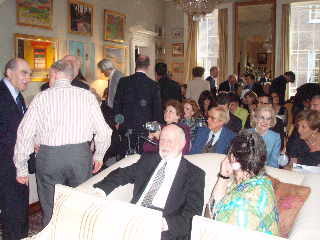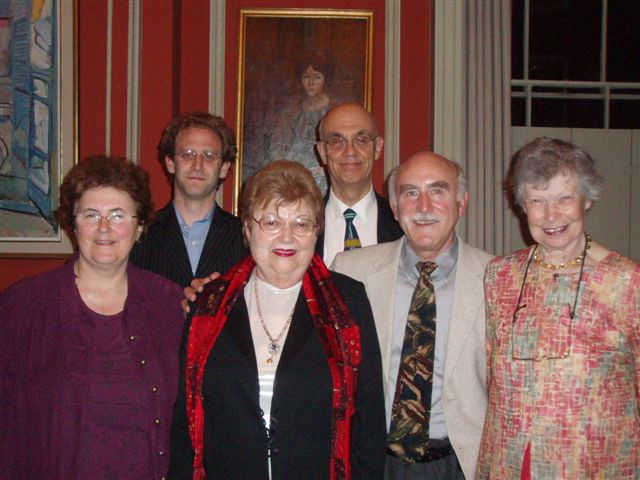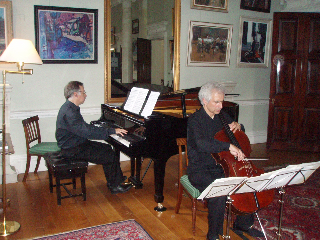Launch of the International Ernest Bloch Society
July 2008
As the 50th anniversary of Ernest Bloch’s death in July 1959 approached Dr Alexander Knapp (the noted Bloch scholar and formerly the Joe Loss Lecturer in Jewish Music at SOAS, University of London) brought together a group of people under the auspices of the Jewish Music Institute to honour the composer and to help to re-establish Bloch as one of the truly significant voices in 20th-century Western art music.

One of the first outcomes of the group’s deliberations was a full-scale international conference on Ernest Bloch in July 2007. This was the first ever devoted entirely to Bloch, the man and the musician. It was held under the auspices of the Jewish Music Institute at Fitzwilliam College, Cambridge, attended by academics and performers as well as many members of the Bloch family and an interested lay-public from the UK, USA, Switzerland, Israel and Japan. You can read a full review of the conference by Dr Malcolm Miller and see some lovely pictures of punting on the Cam. The conference was designed to herald a world-wide Bloch Festival in many parts of the world during 2009 to commemorate the 50th anniversary of his death.
Alex Knapp writes:
In the run-up to the anniversary which would see a series of high-profile events, and in close discussion with third and fourth generation members of the Bloch family living today in the USA and Switzerland – it was decided to relaunch the Ernest Bloch Society in a broader format, as reflected in its new title: ‘The International Ernest Bloch Society’ (IEBS). This would be an ‘umbrella’ under which the various national Bloch Societies, evolving in different parts of the world, would pursue their activities autonomously. And on Tuesday 8 July 2008, in the magnificent Mansfield Street, Central London home and concert venue of Bob and Elisabeth Boas, this new organisation was born.
The original ‘Ernest Bloch Society’ had come into being in New York and London in 1937, when the composer was 57 years old. It was a brilliant organisation, attracting some of the most prominent composers, conductors, and scholars on both sides of the Atlantic, with Albert Einstein as its Hon. President. During World War II, the Society receded into limbo; and it was only in 1967, eight years after Bloch's death, that it was revived in the USA by the "second generation" (i.e. his children Ivan, Suzanne, Lucienne). However, despite enormous efforts by the wider family and friends of Bloch, and the publication of a Bulletin once every year or two, this organization, too, foundered in the 1990s. In its place, between 1990 and 2006, came the "Ernest Bloch Music Festival" centred upon Newport, Oregon - the coastal town just south of Agate Beach, where Bloch lived the final 18 years of his life. This Festival was held almost every summer, and comprised concerts, lectures, a composers' symposium, and a summer school for musically talented teenagers.
Assembled together in anticipation of the launch of the new International Ernest Bloch Society were nearly a hundred invited members of the public, representing every aspect of the musical life of the metropolis at the highest level. On arrival, all were encouraged to sign the Guest Book and receive information (boas22m@btinternet.com) about the series of Classical chamber music concerts that take place on a regular basis in the Boas’ splendid recital room .
The evening began with social interaction - to the accompaniment of copious wine and refreshments, and continued with a number of brief ‘live’ and pre-recorded speeches, followed by a short cello and piano recital upstairs in the recital room. Guests were provided with (1) a programme sheet for the evening, (2) a complete list giving the names of the Hon. President, Hon. Vice-Presidents and Honorary Officers of the IEBS, (3) an ‘Ernest Bloch Legacy Project’ booklet, (4) publicity regarding the recordings of Professor Dalia Atlas, and (5) an IEBS membership form.
The formal proceedings were opened by Dr Norman Solomon, Treasurer of the IEBS, who gave a moving account of his personal connection with Bloch's music through his late wife Devora, who had been a professional violinist and whom he had frequently accompanied on the piano in concert performances. We are deeply grateful to him for having enabled substantial funds from the Nordev Trust to be made available to support the 2007 Conference and the 2009 Festival in the UK.
At this point, Norman invited me to take over as host for the formal presentations.

The second speaker was to have been Sir Charles Mackerras, CH, AC, CBE, the President of the IEBS; but sadly he and Lady Mackerras were indisposed. Their apologies for absence were communicated to the audience; and warm wishes for their rapid recovery were expressed.
My presentation began with a reference to my earliest days of doctoral research in New York in 1968-69 with Bloch's elder daughter Suzanne. I then outlined the enormous range of Bloch's vocal, choral, instrumental and orchestral works, from music of the most thundering majesty to the most delicate miniatures, from pieces reflecting neo-classical and neo-romantic styles, to those revealing French and Swiss, Chinese, American and Native American, Gregorian and, of course, Jewish influences. I asked why only about ten or eleven works out of a total of 69 have remained in the regularly performed Western Classical mainstream repertoire of today. Of commercially available recordings there are plenty; but what of live concerts, recitals and broadcasts? How different from the 1920s, 30s and 40s, particularly in the USA, UK and Italy, when Bloch was revered as the fourth ‘B’ after Bach, Beethoven and Brahms...
All the speakers who followed were Vice-Presidents of the IEBS. The next was Dr Frank Geltner, who had travelled specially from Portland, Oregon, for this event. He informed the audience of the aims and objectives of the newly constituted ‘Ernest Bloch Legacy Foundation’ (EBLF), the American host organisation for the ‘Ernest Bloch Legacy Project’, whose main purpose, currently, is to raise funds for the purchase of the ‘Bloch House’ in Agate Beach in order to transform it into an international centre for Bloch research and performance. The EBLF, though an independent body, would work enthusiastically with the IEBS in the proliferation of Bloch's music.
Frank, the Vice-President of the EBLF, then introduced a DVD film made specifically for this occasion by Ernest Bloch II, grandson of the composer, and President of the EBLF, who had been unable to fulfil his intention to fly in from Portland, but who wished to participate as actively as possible in the festivities. On behalf of his sister Joni Metolius, cousin Sita Milchev, and the Bloch family as a whole, Ernie Bloch extended sincerest thanks to all who had brought the IEBS to fruition, and shared our vision for the future.
Oliver Margulies, co-founder and Secretary of the Swiss Association for the 2009 -10 Bloch Festival gave a vivid account of the many concert plans for the Jubilee, working in close co-operation with Alain Hirsch (grandson of Bloch's sister Loulette) and his son Laurent.
Professor Dalia Atlas, the Head of the Ernest Bloch Society of Israel, spoke eloquently of her passion for Bloch, as evidenced in the five CDs (published by ASV and Naxos) featuring 15 of his symphonic works, played by the Atlas Camerata, the RPO, the Slovak Radio Symphony Orchestra, and soloists of the Israel Philharmonic, all under her baton. She outlined her programme of education for all Israeli schools, conservatoires, universities and other musical organisations, in preparation for performances and workshops during the Jubilee year.

Pictured left to right at the launch of the Society in London on 8 July 2008: Geraldine Auerbach MBE Director of the Jewish Music Institute and member of the IEBS UK committee, Oliver Margulies Head of the Swiss Ernest Bloch Committee, Dalia Atlas, conductor or Bloch’s works and Head of the Israeli Bloch Committee, Alexander Knapp, Bloch Scholar and instigator of the Bloch Jubilee Conference and Festival, Frank Geltner of the Ernest Bloch legacy project in Portland Oregon, and J Audrey Ellison, Secretary of the International Ernest Bloch Society
The final speech was given in absentia in the form of a PowerPoint presentation by Ms Li Jin, Representative of the IEBS in Beijing. Senior Journalist with Music Weekly - the most prestigious music newspaper in China, and author of what is to be the first full-scale Chinese-language history of Jewish music, she described her strong affinity for Jewish culture, and expressed her desire to bring Jewish music to the Chinese people. She reflected not only upon the Jewishness of many of Bloch's works, but also on his lesser known relationship with Chinese philosophy. Her plans for the Jubilee would be to help organize concerts of Bloch's orchestral works in Beijing, Shanghai and Nanjing. Her words were accompanied by compelling visual images of Jerusalem, Beijing, Shanghai, and Lhasa.

The second part of the formalities consisted of a recital of cello and piano music beautifully conceived and performed by Professor Yosif Feigelson (USA) and Dr Malcolm Miller (UK). The programme began with Bloch's Méditation Hébraïque (1924) - dedicated to Pablo Casals, and continued with the six-movement Suite no.2 for Unaccompanied Cello (1956) - dedicated to Zara Nelsova. This was followed by Bloch's own arrangement (1947) of Nigun, better known as the centrepiece of his three-movement Baal Shem Suite for violin and piano (1923) and dedicated to his mother. By way of contrast to the deep intensity of Bloch's works, Yosif and Malcolm brought the recital to a close with three movements from Joachim Stutschewsky's sparkling Israeli Suite.
Before we returned downstairs for further refreshments, I expressed my warmest thanks to several individuals without whom the Launch could never have been the unforgettable occasion that it undoubtedly was: not only to all who had spoken and performed with such dignity and feeling, but also to Bob and Elisabeth Boas for their most generous and gracious hospitality; to Geraldine Auerbach, MBE, Director of the JMI, for having been so supportive in numerous ways and for making a DVD recording of the entire event; to Milein Cosman for allowing the IEBS to incorporate her highly expressive line-drawing of Bloch (1949) as our official logo; to Simon Morris for kindly loaning his superb cello to Yosif for his performance at the Launch, as well as during the Conference Recital a year ago; to all members of the IEBS Committee and of the Ernest Bloch Festival 2009 Committee for their much appreciated dedication; and deepest gratitude to our Secretary Audrey Ellison, the driving force and administrative mastermind behind all the activities of the IEBS, whose indefatigable energy and commitment are an example, to us all, of sheer devotion and love.
Alexander Knapp: Chairman, IEBS 2008.
Go to top